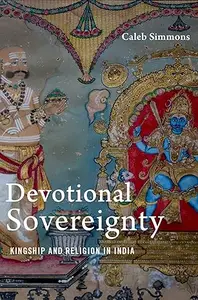- Joined
- Jul 3, 2023
- Messages
- 91,795
- Reaction score
- 1
- Points
- 38

Free Download Caleb Simmons, "Devotional Sovereignty: Kingship and Religion in India"
English | 2020 | pages: 290 | ISBN: 0190088893 | PDF | 39,8 mb
Devotional Sovereignty: Kingship and Religion in India investigates the shifting conceptualization of sovereignty in the South Indian kingdom of Mysore during the reigns of Tipu Sultan (r. 1782-1799) and Krishnaraja Wodeyar III (r. 1799-1868). Tipu Sultan was a Muslim king famous for resisting British dominance until his death; Krishnaraja III was a Hindu king who succumbed to British political and administrative control. Despite their differences, the courts of both kings dealt with the changing political landscape by turning to the religious and mythical past to construct a royal identity for their kings. Caleb Simmons explores the ways in which these two kings and their courts modified and adapted pre-modern Indian notions of sovereignty and kingship in reaction to British intervention.
The religious past provided an idiom through which the Mysore courts could articulate their rulers' claims to kingship in the region, attributing their rule to divine election and employing religious vocabulary in a variety of courtly genres and media. Through critical inquiry into the transitional early colonial period, this study sheds new light on pre-modern and modern India, with implications for our understanding of contemporary politics. It offers a revisionist history of the accepted narrative in which Tipu Sultan is viewed as a radical Muslim reformer and Krishnaraja III as a powerless British puppet. Simmons paints a picture of both rulers in which they work within and from the same understanding of kingship, utilizing devotion to Hindu gods, goddesses, and gurus to perform the duties of the king.
Buy Premium From My Links To Get Resumable Support and Max Speed
Rapidgator
3oqi6.7z.html
TakeFile
3oqi6.7z.html
Fileaxa
Loading…
fileaxa.com
3oqi6.7z.html
Links are Interchangeable - Single Extraction



